#dailyzoo
Explore tagged Tumblr posts
Text
What is the impact of using social outreach and engagement for link acquisition?
Social outreach and engagement can have a significant impact on link acquisition.
In today's digital age, where search engine algorithms are constantly evolving, building high-quality backlinks is crucial for improving your website's visibility and rankings.
And social media platforms provide a great opportunity to do just that. Let's dig deeper to provide you with more information.
“While link building was all about quantity in the past, quality has the upper edge in 2023 and beyond. The quality and authority of the pages where you build links play a major role in ranking” – Moz
Social Outreach and Engagement for Link Acquisition:
1. First and foremost, social outreach allows you to connect with a wider audience and build relationships with influencers and industry leaders.
By engaging with them, sharing their content, and participating in discussions, you can establish yourself as an authority in your niche.
This credibility will not only attract more followers but also open doors for potential partnerships and collaborations.
“The future is all about deeper, more meaningful partnerships. We're not just talking link exchanges or guest blogs. Think joint webinars, revenue-sharing models, and even live interviews. It's like taking your relationship to the next level but in a totally professional way” – DailyZoo Newsletter
2. When it comes to link acquisition, social media can act as a catalyst for generating high-quality backlinks.
By creating compelling and shareable content, you increase the chances of it being shared by others, thereby generating natural backlinks.
Moreover, when you actively engage with your audience on social platforms, you create opportunities for others to mention and link back to your website or blog.
3. Additionally, social media platforms like Facebook and LinkedIn allow you to join relevant groups and communities where you can share your expertise and provide value to others.
By consistently contributing valuable insights and answering questions, you position yourself as a thought leader in your industry.
This can lead to more people referencing and linking back to your content. You may also take advantage of Quora.
“A strong LinkedIn presence is crucial. It helps showcase your expertise, expand your network, and unlock new opportunities” – Growth Daily Newsletter
4. Another way social outreach impacts link acquisition is through guest blogging. Many websites and blogs accept guest posts from industry experts.
By networking with influencers on social media, you can find opportunities to contribute guest posts to their platforms.
This not only helps you reach a wider audience but also allows you to include backlinks to your own website within the content.
“Guest blogging boosts SEO with quality backlinks, but beware of spammy tactics. For success, find good prospects, do strategic outreach, produce great content, and uphold a strong brand” – The Traffic Talk Newsletter
5. Furthermore, social media engagement can indirectly influence link acquisition by increasing brand awareness and driving more organic traffic to your website.
As your social media following grows, more people will become aware of your brand and actively search for it.
This increased brand visibility leads to more direct searches for your brand name, resulting in higher click-through rates from search engine results pages (SERPs).
Search engines like Google take these engagement signals into account when determining rankings, which can ultimately lead to more organic backlinks.
Remember, the impact of using social outreach and engagement for link acquisition is a time-consuming process. Patience and consistent effort are a must.
“Keep in mind that the impact of your link building will vary depending on your site’s authority and the niche that you’re in. With that said, digital marketing agency Aira found that 1–3 months is the most likely time frame to start seeing results” – Wix SEO Hub
Linkable Assets for SEO Link or Backlink building:
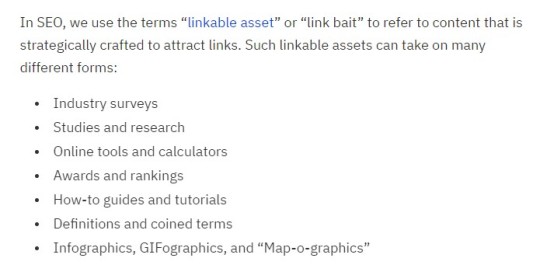
Image Content Source - Ahrefs
In conclusion, social outreach and engagement play a crucial role in link acquisition.
By leveraging social media platforms or networks effectively, you can build relationships, establish credibility, generate natural backlinks, contribute guest posts, increase brand awareness, and drive traffic to your website.
So don't overlook the power of social media when it comes to building a strong link profile and improving your website's visibility in search engine results.
Here's related information that you may also find helpful – How Does Google Measure How Interesting Content Is?
4 notes
·
View notes
Photo

Wednesday's Kitchen Counter Drawing is a Birthday card for my sister. Grateful for all of the #chrisayers #dailyzoo books teaching me how to infuse character into animals. Her spirit animal: the cupcake crazed hedgehog #art #sketch #sketchbook #watercolor #birthdaycard #kitchencounterdrawings (at West Hollywood, California)
0 notes
Text
Benefits of Guest Blogging
Guest blogging is one of the most effective ways to boost your online presence and expand your reach in the digital world.
In fact, it is part of off-page SEO efforts that is so powerful, while also not easy today.
Anyways, let me break down some of the key benefits of guest blogging for you right away.
Do you know? - “Guest posting isn't just great for search engine optimization (SEO); it helps to build credibility for your brand” – G2
Benefits of Guest Blogging:
Here are the various benefits of guest blogging (or guest posting):
1. Increased Exposure:
By contributing your content to other blogs in your niche, you are exposing yourself to a new audience that may not have come across your own blog.
This can help drive more traffic to your site and increase your visibility.
2. Builds Authority:
When you write for reputable blogs within your industry, you are positioning yourself as an expert in your field. This can help build credibility and trust with your audience.
3. Backlinks:
One of the significant benefits of guest blogging is the opportunity to include backlinks to your own website within the content.
These backlinks can improve your site's SEO and drive more organic traffic. It is for this reason that most focus on doing it.
4. Networking:
Guest blogging allows you to connect with other bloggers and influencers in your niche.
Building relationships with these individuals can open up new opportunities for collaborations and partnerships in the future.
Remember - “The future is all about deeper, more meaningful partnerships. We're not just talking about link exchanges or guest blogs. Think about joint webinars, revenue-sharing models, and even live interviews to help take your professional relationships to the next level” – DailyZoo Newsletter
5. Enhances Writing Skills:
Writing for different blogs with varying audiences and tones can help you improve your writing skills and adaptability as a writer.
6. Generates Leads:
By reaching a new audience through guest blogging, you have the potential to generate more leads for your business or website.
7. Boosts Social Media Presence:
Guest posts are often shared on social media platforms, increasing your content's reach and engagement.
8. Increases Brand Awareness:
Through guest blogging, you can introduce your brand to a wider audience and create brand recognition within your industry.
If you haven't tried guest blogging yet, I highly recommend doing it for your business. Remember, it is also not easy today, as I said before.
“The cruel reality of guest blogging is that even if they’re good, your emails can be rejected or ignored. That’s no fault of yours—publications are just too busy” – Ahrefs
Approach for Guest Posting Opportunity:

Only pursue guest blogging or guest posting on platforms that are relevant to your niche and have a professional, reputable presence.
In conclusion, guest blogging is a powerful strategy that can benefit both your personal brand and your business.
It's a win-win situation where you get to share valuable content with a new audience while also reaping the rewards of increased visibility, authority, and networking opportunities.
Here's related information that you may also find helpful – B2B SEO Best Practices
0 notes
Text
Affiliate Marketing Mistakes To Avoid
Affiliate marketing is one of the lucrative ways to generate passive income online. In fact, it can be an exciting journey, but it's faced with potential pitfalls.
Yes, many new affiliate marketers just stumble due to common, yet avoidable errors.
In this blog post, you will be exposed to the most common affiliate marketing mistakes to avoid, and pave your way to success in this field.
To give you more information, let's go deeper. Also, don't forget to read the FAQs at the end.
Do you know? - "97% of affiliates fail" - ClickBank
Affiliate Marketing Mistakes To Avoid:
Here are the eight common affiliate marketing mistakes to avoid so you can drive maximum affiliate income or commissions:
1. Choosing the Wrong Affiliate Products:
One of the most common mistakes in affiliate marketing is promoting affiliate products that are not relevant at all to your target audience.
Make sure to select products that align with your niche and appeal to your followers and audience.
2. Ignoring SEO Strategy:
Search engine optimization (SEO) is crucial for driving organic traffic to your affiliate links through quality content, blog posts or articles.
Ignoring SEO best practices can result in lower visibility and fewer clicks. Be sure to optimize your content with relevant keywords and meta tags.
Additionally, distribute your content across all of your online platforms, including social media networks, while also adopting repurposing strategies as best as possible, to boost your content visibility, reach, attention, and engagement.
3. Overlooking Disclosure Guidelines:
It's important to disclose your affiliate relationships transparently to your audience. In fact, it is also mandatory as per FTC guidelines.
Failure to do so can damage your credibility and violate regulatory guidelines. Always be upfront about your affiliate partnerships.
4. Not Tracking Performance:
Monitoring the performance of your affiliate campaigns is essential for optimizing your strategy.
Track key metrics such as clicks, conversions (leads and sales), and revenue to identify what's working and what needs improvement. You can get basic data from your affiliate program dashboard.
Remember - “In affiliate marketing, conversions are the holy grail of success” – DailyZoo Newsletter, JVZoo Affiliate Network
5. Spamming Your Audience:
Bombarding your audience with excessive affiliate links can come across as spammy and turn off potential customers. In fact, people strongly hate such behavior.
Focus on providing valuable content and strategically incorporating affiliate links where they add value. Remember, the content should guide users for informed decision making.
6. Neglecting Relationship Building:
Building strong relationships with your audience is key to long-term success in affiliate marketing.
In fact, today, personal branding is essential for affiliates to differentiate themselves and stand out.
Engage with your followers, address their needs, watch trends, and establish trust before promoting affiliate products.
7. Not Testing Different Strategies:
Don't be afraid to experiment with different promotional tactics to see what resonates best with your audience.
If your niche website or blog already has a good amount of traffic, A/B testing different approaches can help you refine your affiliate marketing efforts for better results.
Ensure you understand the prohibited strategies in the affiliate program you’re part of; otherwise, you risk losing your commission eligibility.
Prioritize building email lists as they provide a stable marketing channel, offering protection against the unpredictability of SEO industry changes and algorithm-driven social media platforms.
8. Giving Up Too Soon:
Affiliate marketing takes time and persistence to see significant results. Don't get discouraged if you don't see immediate success.
Stay consistent, learn from your mistakes, and continuously improve your strategy. In fact, this is one of the strongest mistakes most affiliates do.
“Your audience is the backbone of your affiliate marketing success. To thrive, you must cultivate a tribe that trusts your word. This journey begins with consistent, high-quality content on social media, blogs, or email. Don't be the pushy salesperson; be the friendly expert who educates and then subtly slides in the sales pitch” – DailyZoo Newsletter
Additionally, remember to stay informed about affiliate marketing industry trends, adapt to changes, and always prioritize providing value to your audience.
Becoming a Successful Affiliate Marketer:

In conclusion, by avoiding these common affiliate marketing mistakes, you can increase your chances of success and maximize your affiliate earnings in the long run.
Here's related information that you may also find helpful – Affiliate Marketing Glossary for Beginners
0 notes
Text
Why is Personal Brand Important?
Personal brand is important in today's digital age for a multitude of reasons. It goes beyond just having a strong online presence or an impressive resume.
In fact, personal branding is the art of showcasing your unique skills, talent, experiences, and personality to stand out from the crowd and leave a lasting impression.
To give you more information, let's go deeper.
Do you know? - “A personal brand isn’t just helpful; it’s essential. As marketing expert Mike Myers said, “If you can’t develop your own brand, people might not have the confidence that you can help them develop a company’s/product’s/agency’s brand.”” – CoSchedule
Personal Brand Importance:
1. First and foremost, personal branding helps you establish credibility and trust.
When you have a well-defined personal brand, it becomes easier for people to recognize you as an expert in your field.
It allows you to position yourself as a thought leader, someone who is knowledgeable and reliable.
This can open up numerous opportunities, whether it's landing a job, attracting clients, or making valuable connections.
2. Moreover, personal branding gives you control over how others perceive you.
By curating your online presence and sharing your expertise through various platforms such as social media, blogs, or podcasts, you have the power to shape your personal narrative.
You can highlight your strengths, showcase your achievements, and share your unique perspective on industry-related topics.
This helps you differentiate yourself from others in a competitive market.
3. Another important aspect of personal branding is that it fosters authenticity. In today's world, people crave genuine connections and value transparency.
By being true to yourself and showcasing your personality through your personal brand, you are more likely to attract like-minded individuals who resonate with your values and beliefs.
This can lead to building a loyal community of followers and supporters who genuinely believe in you and what you stand for.
“Your personal brand is your unique selling proposition. It's not just about selling products; it's about building relationships and establishing yourself as a trusted voice” – DailyZoo Newsletter
4. Furthermore, personal branding enhances your visibility and reach.
When you consistently put out valuable content that is relevant to your target audience, you increase the chances of being discovered by potential employers, clients, or collaborators.
This can lead to exciting opportunities such as speaking engagements, partnerships, or even media features.

Image Content Source - Buffer
5. Finally, personal branding also acts as an insurance for your career or business.
Yes, in today's fast-paced world where industries and businesses are constantly evolving and job security is uncertain, having a strong personal brand can provide stability and ensure that you are always on the radar of potential opportunities.
It gives you the flexibility to pivot and adapt to changing circumstances while still maintaining your credibility and reputation.
6. Remember, investing time and effort into building your personal brand can pay off immensely in terms of career growth, business opportunities, and personal fulfillment.
Remember - “Continuous learning is the lifeblood of any successful career. It will help you transform and shape your personal brand” – Women In Tech SEO
Building a Personal Brand:

In conclusion, personal branding is important because it helps you establish credibility, control how others perceive you, foster authenticity, enhance visibility and reach, and provide stability in an ever-changing world.
So why wait? Start crafting your personal brand today and unlock the doors to endless possibilities in the future!
Here's related information that you may also find helpful – Elements of a Personal Brand
1 note
·
View note
Text
What are the introductory challenges on niche discovery?
Introductory Challenges on Niche Discovery:
Here are some important introductory challenges on niche discovery:
1. Identifying Interests: Difficulty in pinpointing personal passions and strengths that align with market needs.
2. Market Research: Challenges in conducting effective research to understand target audiences and competition.
3. Narrowing Focus: Struggling to limit options and choose a specific niche without feeling restricted.
4. Validation: Uncertainty in validating the niche's profitability and demand before committing.
5. Skill Gaps: Recognizing and addressing any skills or knowledge gaps related to the chosen niche.
6. Fear of Failure: Anxiety about potential failure or lack of success in a new niche.
“The market is vast, and new opportunities emerge constantly. Niche down, identify unique selling points, and cater to specific audience’s needs to stand out” – The DailyZoo Newsletter
Identification of a Profitable Niche:
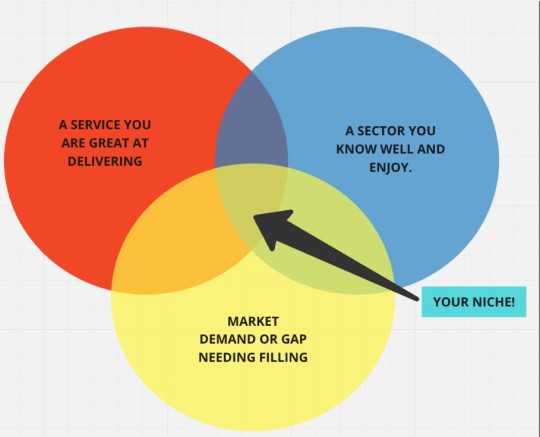
Image Source - Sitebulb
Here's related information that you may also find helpful – How To Find Micro-Niche Ideas? [involving tools and platforms].
0 notes
Text
What type of content should I create to attract followers on Facebook?
The type of content you should explore creating to attract followers on Facebook is short-form videos and images.
Ensure the content is creative, educational, or entertaining depending on your specific needs, or a combination of these elements to capture attention and drive engagement.
Do you know? - “Social Insider reveals that Facebook posts with photos garner 2.3 times more engagement than text-only posts” – DailyZoo Newsletter
Here's related information that you may find helpful:

Image Content Source - Insights from Social Trends 2024 Report by Hootsuite
Here's related information that you may also find helpful – What are Facebook Pages used for? [Take the right advantage].
#Facebook#social media content#Facebook Content#Content Type#social media marketing#Audience Building#Facebook Followers
0 notes
Text
What are the best ways to utilize email marketing to drive sales and customer loyalty?
Email Marketing to Drive Sales and Customer Loyalty:
Here are the best ways to utilize email marketing to drive sales and customer loyalty:
1. Segmentation and Personalization:
Segment your email list based on customer behavior, interests, and demographics to deliver highly personalized and relevant content.
2. Abandoned Cart Emails:
Send targeted emails to customers who have abandoned their shopping carts, encouraging them to complete their purchases.
3. Promotional Offers and Discounts:
Use email to promote limited-time offers, discounts, and exclusive deals to incentivize purchases and build customer loyalty.
4. Educational and Informative Content:
Provide valuable, educational content that addresses your customers' pain points and helps them make informed decisions.
5. Automated Workflows:
Implement automated email sequences, such as welcome series, onboarding, and post-purchase follow-ups, to nurture leads and retain customers.
6. Customer Feedback and Surveys:
Use email to gather customer feedback, reviews, and insights to improve your products, services, and overall customer experience.
Remember - “a solid email list is the bedrock of any successful email marketing strategy, and having engaged subscribers with real interest is one of the most valuable assets to have” – DailyZoo Newsletter

Image Source - Litmus
Pro-Tip: Don’t ignore A/B testing and mobile view optimization to boost email campaign performance.
Here's related information that you may also find helpful – Email Marketing Campaign Benchmark Metrics
0 notes
Text
What is emotional marketing?
Emotional marketing is a powerful strategy that taps into the emotions and feelings of consumers to create a deep connection between them and a brand or product.
It goes beyond showcasing the features and benefits of a product and focuses on evoking specific emotions to influence purchasing decisions.
To give you more information, let's go deeper.
Do you know? - "over 70% said establishing an emotional connection through logo design is important” – Adobe Express
Emotional Marketing:
1. In today's competitive market, consumers are bombarded with countless advertisements and marketing messages daily.
Emotional marketing helps brands cut through the noise and stand out by appealing to the hearts and minds of their target audience.
2. At its core, emotional marketing understands that consumers make decisions based on how they feel, rather than solely on rational thinking.
It recognizes that emotions play a significant role in shaping consumer behavior and leverages this understanding to create memorable and impactful campaigns.
3. By understanding the emotions that drive their target audience, brands can craft marketing messages that resonate deeply with consumers.
Whether it's joy, fear, love, or nostalgia, emotional marketing seeks to elicit a specific emotional response that aligns with the brand's values and resonates with its target audience.
4. One of the most effective ways to implement emotional marketing is through storytelling.
By telling compelling stories that evoke certain emotions, brands can create a narrative that connects with consumers on a personal level.
These stories can be conveyed through various mediums such as videos, social media posts, or blog articles.
“People crave solutions. Showcase your product's potential to transform lives. Don't just list features; tell stories of success. Imagine customers achieving their wildest dreams—that's the emotional connection that seals the deal” – DailyZoo Newsletter
5. Emotional marketing also fosters brand loyalty and advocacy.
When consumers have an emotional connection with a brand, they are more likely to become repeat customers and recommend the brand to others.
This is because emotions create a sense of trust and loyalty, making consumers feel like they are part of something bigger than just a transaction.

Image Content Source - Semrush
6. However, it's important for brands to approach emotional marketing with authenticity and genuineness.
Consumers are becoming increasingly savvy and can easily detect when a brand is trying to manipulate their emotions for purely commercial purposes.
Therefore, brands must align their messaging with their values and ensure that their emotional appeals are backed up by genuine actions.
In conclusion, emotional marketing is a powerful strategy that enables brands to connect with consumers on a deeper level.
By understanding the emotions that drive their target audience and crafting compelling stories, brands can create memorable campaigns that resonate with consumers and drive them to take action.
However, brands need to approach emotional marketing authentically to build trust and foster long-term relationships with their customers.
Here's related information that you may also find helpful – How does advertising work psychologically? [Be aware of various psychological techniques]
0 notes
Text
Do we need hosting for blogging?
Yes, you need hosting for blogging. Hosting provides the server space where your blog's files, data, and content are stored, allowing your website to be accessible on the internet.
There are various hosting options available, including shared hosting, virtual private servers (VPS), and dedicated hosting, each with its own features and capabilities.
Additionally, there are also specialized hosting services tailored specifically for blogging platforms, which can optimize the performance and security of your blog.
Remember - “First impressions matter! Craft a visually appealing website with a user-friendly layout. Most hosting providers offer AI-powered website builders to help you get started” – DailyZoo Newsletter
Here's related information that you may also find helpful – Does the location of your hosting company affect SEO?
0 notes
Text
What are the pros and cons of niche vs. broad-market affiliate marketing?
Pros and Cons of Niche vs. Broad-Market Affiliate Marketing:
Here are the pros and cons of niche vs. broad-market affiliate marketing:

Remember - “Building a successful affiliate marketing business takes time and dedication. Don't be disheartened by the absence of immediate results. Keep creating high-quality content, fostering trust with your audience, and refining your strategy based on data” – DailyZoo Newsletter
Here's related information that you may also find helpful – Why is affiliate marketing so hard?
0 notes
Text
Why is personalization important in online marketing?
Importance of Personalization in Online Marketing:
Personalization is important in online marketing for the following reasons:
1. Enhanced Customer Experience:
Tailoring content to individual preferences and behaviors leads to a more engaging and relevant experience for the customer.
2. Increased Engagement:
Personalized marketing efforts can result in higher click-through rates, conversions, and overall engagement with the brand or business.
3. Improved Customer Loyalty: By showing that you understand and care about your customers' needs, you can foster stronger loyalty and long-term relationships.
4. Better ROI:
Personalized marketing can lead to improved return on investment by targeting the right audience with the right message at the right time.
5. Relevance:
Personalization ensures that the content and offers presented to the audience are relevant to their interests, increasing the likelihood of conversion.
6. Customer Retention:
Tailored communication and offers can help retain existing customers by making them feel valued and understood.
7. Data Utilization:
Personalization leverages customer data to deliver targeted messaging, making the most of available customer insights, and avoiding wastage of resources.
8. Competitive Advantage:
Brands or businesses that effectively personalize their marketing efforts often stand out in a crowded marketplace, gaining a competitive edge, which is not so easy today.
9. Behavioral Insights:
Personalization enables marketers to analyze customer behavior and preferences, providing valuable insights for future marketing strategies.
10. Cross-Selling and Up-Selling:
Personalized recommendations and offers can effectively drive cross-selling and up-selling opportunities, increasing revenue.
11. Adapting to Individual Needs:
Personalization allows marketers to adapt their messaging and offerings over time to address the specific needs and pain points of individual customers.
Remember - “The potential for personalization is enormous. Access to transaction history can help marketers understand consumer behavior, preferences, and spending habits. This data is gold when it comes to building customer profiles and tailoring marketing strategies” – DailyZoo Newsletter
Barriers to Data-Driven Personalization:

Image Source - The 2024 State of Data-Driven Personalization in Marketing by ICUC Social and Convince & Convert
Here's related information that you may also find helpful – Personalized Marketing Statistics [This is a today’s need].
0 notes
Text
Is email marketing dying?
No, email marketing is not dying. In fact, it continues to be one of the most effective and powerful marketing strategies available to businesses today.
While there may be new marketing tactics and channels emerging, email marketing still remains a tried-and-true method for reaching and engaging with your target audience.
Let's get into why email marketing is still alive and thriving.
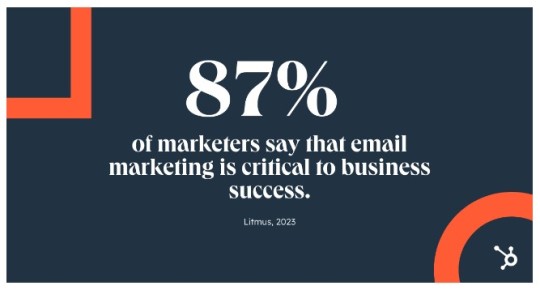
Image Source - HubSpot
Email Marketing Dying?:
1. High ROI:
Email marketing consistently delivers a high return on investment (ROI) for businesses.
According to various studies, every $1 spent on email marketing generates an average of $38 in revenue.
This impressive ROI is due to the low cost of sending emails and the ability to directly target and personalize messages to individual subscribers.
“Fast forward to May 2023, and research unveils a staggering 77% surge in email engagement over the past year. Email marketing isn't just relevant; it's making a swift comeback” – DailyZoo Newsletter
2. Wide Reach:
Email has a massive reach, with billions of active email users worldwide.
It allows you to connect with your audience directly in their personal inbox, where they're likely to check multiple times a day.
This level of accessibility ensures that your message is seen by a large number of people, increasing the chances of conversion.
3. Personalization:
One of the key strengths of email marketing is its ability to deliver personalized content.
With advanced email marketing tools, you can segment your subscriber list based on various criteria such as demographics, purchase history, and engagement level.
This allows you to send targeted messages that resonate with each recipient, resulting in higher open rates, click-through rates, and conversions.
“you will need to regularly clean your list of inactive users to maintain good email deliverability and prevent your emails from landing in spam folders.” – Moosend
4. Automation:
Email marketing automation has revolutionized the way businesses engage with their audience.
With automation tools, you can set up triggered emails based on specific actions or events, such as welcome emails for new subscribers or abandoned cart reminders.
This helps streamline your marketing efforts, save time, and deliver timely messages that are highly relevant to your subscribers.
5. Measurable Results:
Email marketing provides detailed analytics and insights that allow you to track the performance of your campaigns.
You can measure metrics such as open rates, click-through rates, conversion rates, and revenue generated.
These insights help you understand what works and what doesn't, enabling you to optimize your campaigns for better results.
“Studies have shown that A/B testing can improve email conversion rates by 49%.” – Creatopy
Average Email Marketing Stats by Industry Benchmark:
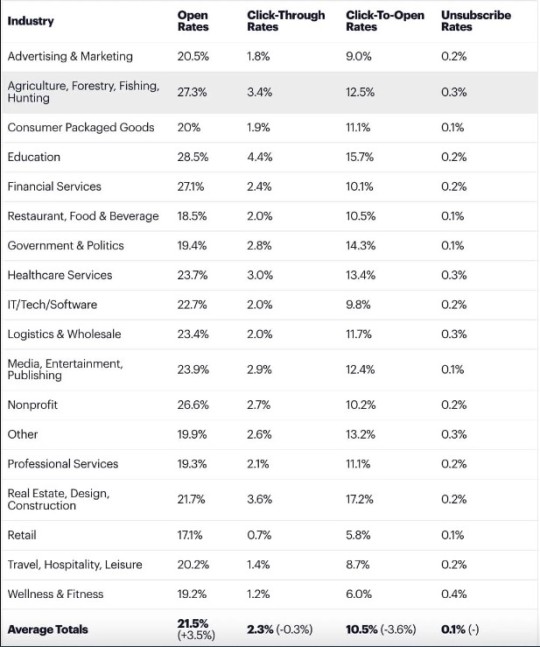
Image Source: HubSpot
6. Integration with other Channels:
Email marketing seamlessly integrates with other digital marketing channels.
You can incorporate social media buttons in your emails to encourage social sharing, or include links to blog posts or landing pages to drive website traffic.
By leveraging multiple channels together, you can create a cohesive and comprehensive marketing strategy that maximizes your reach and impact.
“Emails can satisfy each marketing funnel stage depending on what you send” – Semrush
So don't overlook this evergreen, valuable channel in your marketing arsenal; embrace it and make it work for your business!
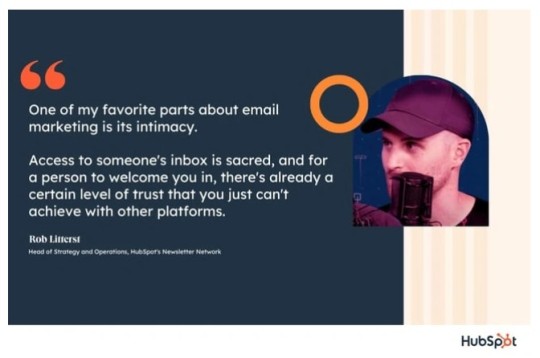
In conclusion, email marketing is far from dying. It continues to evolve and adapt to changing consumer behaviors, policies, and technological advancements.
By leveraging its strengths – high ROI, wide reach, personalization, automation, measurable results, and integration – businesses can harness the power of email marketing to drive engagement, conversions, and ultimately, business growth.
Here's related information that you may also find helpful – Email Copywriting Tips [Build attention and engagement].
0 notes
Text
What is affiliate marketing v/s referral marketing?
Affiliate Marketing v/s Referral Marketing:
Affiliate Marketing:
Affiliate marketing involves a partnership between a company and individuals (affiliates) who promote the company's products or services through unique tracking links.
Affiliates earn a commission for every sale, lead, or action generated through their promotional efforts.
It's commonly used in e-commerce and online businesses to expand reach and drive sales through a network of affiliates.
“The low-risk, high-reward nature of affiliate marketing makes it a win-win for businesses and marketers alike. It's a holistic marketing solution that builds brand awareness while driving traffic, making it a key player in shaping the future of promotional strategies” – DailyZoo Newsletter
Referral Marketing:
Referral marketing relies on existing customers or brand advocates to refer new customers to a business in exchange for rewards, discounts, or other incentives.
It leverages word-of-mouth and personal recommendations to acquire new customers and build brand loyalty.
Referral marketing often focuses on building strong customer relationships and rewarding loyal customers for their advocacy.
In summary, while affiliate marketing involves partnerships with external individuals or organizations to drive sales, referral marketing relies on existing customers to refer new business in exchange for incentives.
Here's related information that you may also find helpful – CPA Marketing vs Affiliate Marketing
0 notes
Text
How can engaging visuals enhance your Facebook posts?
Engaging visuals can enhance your Facebook posts in the following ways:
1. Increased Attention:
Eye-catching visuals can capture users' attention as they scroll through their feeds, increasing the likelihood of stopping to view the post.
2. Improved Storytelling:
Visuals can effectively convey emotions, stories, and messages, making your posts more compelling and memorable.
3. Higher Engagement:
Posts with engaging visuals often receive more likes, comments, and shares, thus boosting overall engagement.
4. Brand Identity:
Consistent and appealing visuals can help reinforce your brand's identity and make your posts more recognizable to your audience.
5. Information Retention:
Visual content tends to be more memorable, helping your audience retain key information about your brand or products.
6. Call-to-Action Emphasis:
Visuals can be used to highlight and emphasize call-to-action (CTA) elements, increasing the likelihood of user interaction.
Remember - “Judiciously assess the quality of your visuals, for consumers subconsciously judge the professionalism of your content. Whether it's a photo, infographic, or video, amateurish visuals may inadvertently signal subpar products and services” – DailyZoo Newsletter
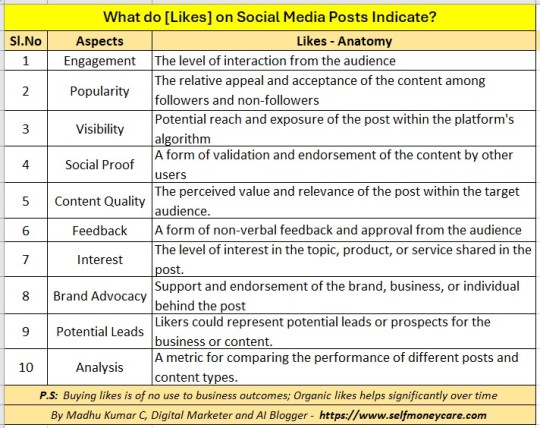
In summary, integrating high-quality and relevant visuals into your Facebook posts can significantly enhance their impact and effectiveness.
Here's related information that you may also find helpful – What are Facebook Pages used for? [Take the right advantage].
0 notes
Text
What are some reliable methods for monetizing a blog, website, or social media presence?
Reliable Methods for Monetizing a Blog, Website, or Social Media Presence:
Here are the various reliable methods available (as implemented by many pros, in at least 2 or more) for monetizing a blog, website, or social media presence:
Methods for Monetizing a Blog:
Display Ads
Affiliate Marketing
Selling Own Products (Digital or Physical)
Lead Generation, Nurturing, and Promotion
Consulting and Coaching
Sponsored Content
Guest Posting or Blogging
Cross-Promotion for Business Deals
Membership or Subscription Model
Freelancing
Selling Ad Space (direct relationship with brands and businesses)
Conducting Workshops
“As you go to monetize your lists, it’s key to start off slow and not try to squeeze too much out of the list too soon which will burn or destroy your list” – DailyZoo Newsletter
Methods for Monetizing a Website:
Display Ads
Affiliate Marketing
Selling Own Products
Lead Generation, Nurturing, and Promotion
Consulting and Coaching
Sponsored Content
Guest Posting or Blogging
Cross-Promotion for Business Deals
Freelancing
Selling Ad Space (direct relationship with brands and businesses)
Conducting Workshops
“And, for those looking to monetize, high engagement shows brands that you have a loyal following that values your opinion, leading to potential sponsorships” – Google for Creators
Methods for Monetizing a Social Media Presence:
Social Media Platform Specific Monetization Program (based on content engagement, views, and subscribers)
Affiliate Marketing
Influencer Marketing
Selling Own Products
Lead Generation, Nurturing, and Promotion (via optimizing social media profiles)
Consulting and Coaching
It's important to keep in mind that effectively monetizing an online presence requires consistency, dedication, high-quality content, attention to analytics, and patience over time.

Image Content Source - 2023 Content Entrepreneur Benchmark Research Report
In conclusion, by strategically leveraging these methods, content creators, marketers, bloggers, or business owners can unlock the full potential of their online platforms and generate sustainable revenue streams.
Here's related information that you may also find helpful – Why Blogs Fail? [Top 7 reasons along with pro-action plans for success]
#blog monetization#website monetization#social media monetization#make money online#blogging#earn income online
0 notes